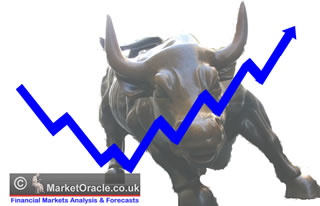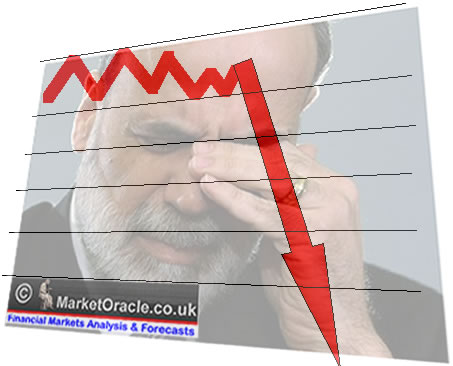For Stock Markets It Seems the Only Way is UP
Stock-Markets / US Stock Markets Aug 04, 2009 - 05:58 AM GMTBy: PaddyPowerTrader
 The markets summer of love with stocks continued unabated yesterday as the S&P topped 1,000 and the Nasdaq pushed through the 2,000 barrier for the first time since October. Yesterday’s fresh catalyst was Ford’s bullish sales report (up 2.4% YOY, their 1st monthly rise since Nov 2000) and a better than expected jump in manufacturing ISM (which was no clunker, see below), while renewed gains in commodities and oil (above $71 barrel) cheered producers.
The markets summer of love with stocks continued unabated yesterday as the S&P topped 1,000 and the Nasdaq pushed through the 2,000 barrier for the first time since October. Yesterday’s fresh catalyst was Ford’s bullish sales report (up 2.4% YOY, their 1st monthly rise since Nov 2000) and a better than expected jump in manufacturing ISM (which was no clunker, see below), while renewed gains in commodities and oil (above $71 barrel) cheered producers.
The S&P is now 50% off its March 6th low of the number of the beast 666. The 1,005 level was the previous highs in both October and November and may provide some resistance for any future rallies. Above that there is little or no technical resistance until 1,100. An overshoot seems the more likely scenario now as investors chase the market higher.
Today’s Market Moving Stories
- Japan’s Nikkei share average rose 1.1% to a 10-month high overnight, driven by technology-related stocks. The MSCI index of Asia Pacific stocks outside Japan also climbed 1.1%, with the materials sector outperforming by a wide margin, up 2.9 %. Since March 9, when the global equity market rally began, the index has risen 77%, leading the world. Valuations have been ticking higher, but so far investors have been comfortable paying what they view as a growth premium. On a 12-month forward basis, the Asia Pacific index is trading at around 14.8 times earnings, below the last bull market peak of 16 times.
- No wonder crude prices are up. Reuters reports that China’s main ports received 25% more crude oil in July than a year earlier, signalling that total crude oil imports last month may have risen at the fastest pace in nearly two years to challenge record highs. The ports shipped in 16.27 million tonnes, or 3.83 million barrels per day (bpd), of imported crude oil in July, the Ministry of Transport said. The figure, which may vary from official crude import data due for release next week, does not take into account shipments by pipeline or railway from Russia and central Asian countries. China imported a record 4.02 million bpd of crude oil in March 2008 as it was preparing for the Beijing Olympics. The world’s second-largest oil consumer imported just 3.25 million bpd In July 2008. However in today’s FT we have a warning that the world economy cannot sustain any further rise in the oil price as oil prices rose toward a record high for the year.
- Australia and New Zealand Banking Group has agreed to pay about $550 million to buy some Asian units from British lender Royal Bank of Scotland (whose plans for world domination fell apart with the bridge too far crazy cash takeover of ABN). This follows the pattern of nationalised UK banks having to divest themselves of overseas assets due to government pressure. In other British banking news HSBC, Europe’s biggest bank, is in talks to set up a securities joint venture in China, a senior bank executive said, adding that acquisitions in Asia are currently too expensive and that the bank will focus on organic growth. “We have many networks in Asia so there is no push for us to buy expensive assets in the region,” said Vincent Cheng, HSBC executive director and chairman for Asia-Pacific. Shares of HSBC jumped 6.4% this morning after the bank reported a better-than-expected first-half profit.
 There are a number of key potential market movers for Irish financials this week. The battle for protection of Liam Carroll property empire continues in the Supreme Court today, the British banking results season gets into full swing and tomorrow we get AIB’s results. Results from AIB will be overshadowed by the potential impact of the NAMA roll out, with speculation centring on the level of AIB assets coming under the transfer category and also the “haircut”/discount to be applied. Having previously targeted bad debt levels of €4.3 billion for the full year, the market will be watching the level taken in the H1 period. The ball park figure for assets potentially under NAMA watch will be sought tomorrow but it is unclear if AIB have the information at this stage to give guidance on this figure.
There are a number of key potential market movers for Irish financials this week. The battle for protection of Liam Carroll property empire continues in the Supreme Court today, the British banking results season gets into full swing and tomorrow we get AIB’s results. Results from AIB will be overshadowed by the potential impact of the NAMA roll out, with speculation centring on the level of AIB assets coming under the transfer category and also the “haircut”/discount to be applied. Having previously targeted bad debt levels of €4.3 billion for the full year, the market will be watching the level taken in the H1 period. The ball park figure for assets potentially under NAMA watch will be sought tomorrow but it is unclear if AIB have the information at this stage to give guidance on this figure.- There are those who point to the current market being 10-15% over valued.
- Clearly sick of using dwarfs, the new Amsterdam craze is to toss Smart cars into the canals.

Data Continues To Point To ‘V’ Shaped Recovery, At Least For Now
Over the past year there has been much discussion about what ’shape’ the eventual economic recovery would take. Analysts and investors have posited a Sesame Street style alphabet soup of “L”, “U”, “W” shaped recoveries (and more besides). Given the troubles in global financial markets few have seen much prospect of a “V” shaped recovery, despite that being the norm.
If the latest round of factory sector indicators across the globe is any guide, the probability of a “V” shaped recovery is going to demand more attention – especially if financial markets continue to repair. So V-shaped for today as a temporary surge in vehicle production (cash for clunkers) is likely to pace a much stronger rebound from recession than was thought likely only a month ago. Of particular note, after a mixed set of regional manufacturing surveys, the US manufacturing ISM – which one ignores at one’s peril – easily beat expectations with a 4.1 point increase to 48.9. And the details were even more positive, suggesting to this writer that it is very likely that the next reading of the index will climb above 50. Importantly, new orders rose 6.1 point to 55.3, the highest level since July 2007. At present this is pointing to about as “V-shaped” a recovery as one could imagine. The production index rose to 57.9, the highest since June 2007. And with one eye on Friday’s non-farm payrolls report we noticed that the employment index rose 4.9 point to 45.6.
Of course, there is little doubt that this recovery has been substantially driven by the massive macroeconomic policy response undertaken by central banks and governments across the globe. And I think it is very likely that the recovery would falter quickly if that stimulus was removed any time soon. Over the coming months markets will need to pay renewed attention to both direct and indirect measures of inflation. Any sign of a rebound in pricing pressures would quickly lead to tighter financial conditions, as markets priced in a higher inflation premium and the likelihood of some monetary policy response. On that score I noted a further 5 point rise in the ISM prices paid index this month. At 55.0, this index has increased by 23 point over the past 3 months, presumably strongly influenced by the rebound in industrial commodity prices. Deflation doesn’t seem particularly likely at this point.
Whatever the medium-term prospects for the global economy, the near-term outlook seems likely to remain favourable for risk assets. Just as I was struck by the synchronicity of the global downturn, I also notice by the synchronicity of the upturn. The UK manufacturing PMI climbed back above 50 in July for the first time in 15 months, with new orders back into the mid 50s, suggesting that stability had returned to the UK factory sector (and casting further doubt on the BoE extending QE when it meets later this week). And Euroland manufacturing PMI is not too far behind (indeed the new orders index rose 5pts this month to fall just short of the crucial 50-mark). With the S&P 500 closing above 1000 overnight for the first time since November, one can imagine that there are plenty of cashed-up money managers being asked some hard questions.
Data Today
The main point of interest in the US today will be the June pending home sales report with markets looking for any signs that recovery was dampened by the rise in mortgage rates that took place from late May. Personal consumption spending for June will also be released.
And Finally… The Pesky Problem Of Falling House Prices
Disclosures = None
By The Mole
PaddyPowerTrader.com
The Mole is a man in the know. I don’t trade for a living, but instead work for a well-known Irish institution, heading a desk that regularly trades over €100 million a day. I aim to provide top quality, up-to-date and relevant market news and data, so that traders can make more informed decisions”.
© 2009 Copyright PaddyPowerTrader - All Rights Reserved
Disclaimer: The above is a matter of opinion provided for general information purposes only and is not intended as investment advice. Information and analysis above are derived from sources and utilising methods believed to be reliable, but we cannot accept responsibility for any losses you may incur as a result of this analysis. Individuals should consult with their personal financial advisors.
PaddyPowerTrader Archive |
© 2005-2022 http://www.MarketOracle.co.uk - The Market Oracle is a FREE Daily Financial Markets Analysis & Forecasting online publication.




